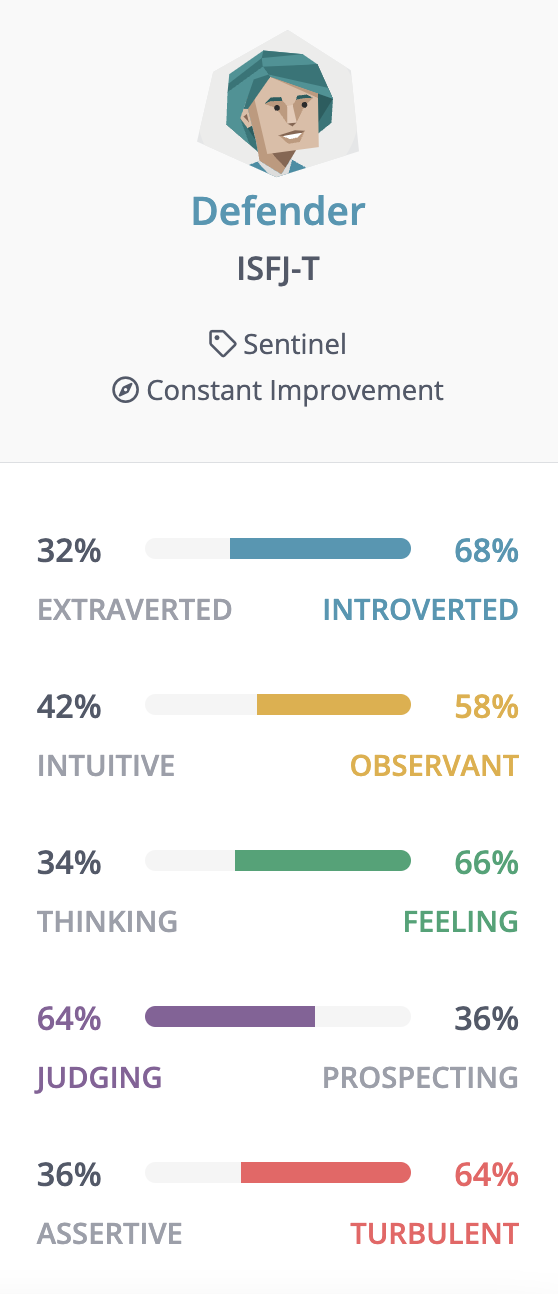Personal Profile
Myer Briggs Test
https://www.16personalities.com/ISFJ-T Defenders are true altruists, meeting kindness with kindness-in-excess and engaging with the work and people they believe in with enthusiasm and generosity.
Defenders tend to feel most energized and effective when they’re showing up for someone who needs their help.
Meticulous and socially oriented, Defenders have a talent for remembering things about other people – a talent that can help them connect with a customer, bolster a faltering business relationship, or simply brighten a colleague’s day.
Defenders’ humility is a strength – but people with this personality type may struggle to get new opportunities unless they learn to take at least some credit for all the work that they do.
Defenders’ gifts include generosity, patience, and determination – but they aren’t people who just want to hear what makes them great. Defenders are committed to actually using these gifts to become better people and be of service to others.

Big 5 Test
https://openpsychometrics.org/tests/IPIP-BFFM/Factor I was labelled as Extroversion by the developers of the IPIP-BFFM. Factor I is sometimes given other names, such as Surgency or Positive Emotionality.
Individuals who score high on Factor I one are outgoing and social. Individuals who score low tend to be shut ins.
Factor II is labeled as Emotional Stability. Factor II is often referred to by other names, such as Neruoticism or Negative Emotionality (in these two cases interpretations are inverted, as Neruoticism and Negative Emotionality can be though of as the opposite of Emotional Stability).
Factor III is labeled as Agreeableness. A person high in agreeableness is friendly and optimistic. Low scorers are critical and aggressive.
Factor IV is labeled as Conscientiousness. Individuals who score high on this factor are careful and diligent. Low scorers are impulsive and disorganized.
Factor V is labeled as Intellect/Imagination. This factor is also often called Openness to Experience.
People who score low tend to be traditional and conventional.
Learning Style Test
http://www.emtrain.eu/learning-styles/Primary Match: Reflector Style
Reflectors prefer to stand back and observe. They tend to be cautious, preferring to take a back seat. They like to collect and analyse information to help them reach their conclusions, which they may take considerable time and effort to develop. Reflectors see the big picture by using information gathered from previous experience as well as the here and now. Learning methods especially suited to reflectors include:
- Paired discussions
- Self analysis questionnaires
- Time out [simply build in sufficient breaks to make space for the reflectors]
- Showcase / Demonstrations
- Feedback from others
- Coaching
Results
| Learning Style | Match % |
|---|---|
| Reflector style | 0.333 |
| Pragmatist style | 0.200 |
| Theorist style | 0.200 |
| Activist style | 0.200 |
Overview
The results of these tests affirm some behaviours I am already conscious of however they further outline areas of improvements for myself. The combination of the personality types, learning and Big5 tests provide opportunity for self reflection and making behavioural shifts where required.
As some behaviours directly focus on behaviour within teams or groups, where those will impact the team negatively, I can ensure those behaviours do not impact team goals.
Every team has individual strengths and weaknesses and this is what can make a team great. The personality tests can support in team members learning about each other and taking steps to ensure a positive outcome for the team.